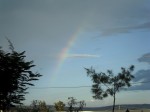Full Moon
Living with a sense of wonder: Full moon rises tonight@ 7:36 PM CDT/ Lake Charles.
If the moon only rose yearly, or even monthly, or periodically like an eclipse, we’d turn out school to watch it. The sight of this huge satellite rising through the pines always gives me a thrill.
It’s a gift from God not to be overlooked. Enjoy tonight’s full moon.
Weeds and Seeds
I heard this story from a friend in Vernon Parish: A young woman married much to the distress of her parents. They didn’t like her choice of husband.
Her father never liked his son-in-law and tried to make his life miserable. Finally, the younger man had enough. He slipped into the father in law’s prize hayfield and sowed Johnson grass seed.
Of course, it ruined the field.
But there is justice in this world, when the older man died, he willed the hayfield to his daughter (and son in law). They got it Johnson grass and all.
This parable of Jesus addresses the tough question: Why do the wicked flourish along with the Godly?
Matthew 13:24 – 30 (NKJV) 24Another parable He put forth to them, saying: “The kingdom of heaven is like a man who sowed good seed in his field; 25but while men slept, his enemy came and sowed tares among the wheat and went his way. 26But when the grain had sprouted and produced a crop, then the tares also appeared. 27So the servants of the owner came and said to him, ‘Sir, did you not sow good seed in your field? How then does it have tares?’ 28He said to them, ‘An enemy has done this.’ The servants said to him, ‘Do you want us then to go and gather them up?’ 29But he said, ‘No, lest while you gather up the tares you also uproot the wheat with them. 30Let both grow together until the harvest, and at the time of harvest I will say to the reapers, “First gather together the tares and bind them in bundles to burn them, but gather the wheat into my barn.”
Matthew 13:36-43 Jesus explains the parable. This is one of the few parables that Jesus explained to the disciples.
36Then he left the crowd and went into the house. His disciples came to him and said, “Explain to us the parable of the weeds in the field.”
37He answered, “The one who sowed the good seed is the Son of Man. 38The field is the world, and the good seed stands for the sons of the kingdom. The weeds are the sons of the evil one, 39and the enemy who sows them is the devil. The harvest is the end of the age, and the harvesters are angels.
40“As the weeds are pulled up and burned in the fire, so it will be at the end of the age. 41The Son of Man will send out his angels, and they will weed out of his kingdom everything that causes sin and all who do evil. 42They will throw them into the fiery furnace, where there will be weeping and gnashing of teeth. 43Then the righteous will shine like the sun in the kingdom of their Father. He who has ears, let him hear.
a. The good sower is the Son of Man… Jesus.
b. The field is the world.
c. The good seeds God’s people.
d. The tares/weeds: the wicked.
e. The bad sower is the devil.
f. The harvest is the end of the age. Judgment time.
g. The reapers are the angels.
Lessons from this parable:
1. Judgment is coming.
2. All things will be made right.
3. We are to be busy sowing good seed.
Twice I’ve been to the central African country of Rwanda. It’s a beautiful country called the “land of 1000 hills” and “the Switzerland of Africa.”
The people of Rwanda are friendly and helpful. They are the African country that seems most determined to move forward.
However there is a dark stain in Rwanda. It’s the result of the genocide of the mid-1990s. Over 800,000 people died during a 100 day period.*
Neighbor turned on neighbor, church members killed each other, all because of tribal conflict: being identified as a “Hutu” or “Tsutsi.”
Most of the genocidaires (the killers) have been released from prison and now live among their former victims. Many have reconciled while others still are unrepentant. There is a day coming in which each person (not just in Rwanda) will be called to account for their lives and actions. The weeds will be pulled out.
As Longfellow ended his poem/song, “I Heard the Bells on Christmas Day.”
“And though the wrong seems oft so strong,
God is the ruler yet.”

* The excellent movie, Hotel Rwanda, and the book, Shake Hands with the Devil, are the best resourcs on the Rwandan genocide.
 Creekbank Stories Curt Iles, Storyteller
Creekbank Stories Curt Iles, Storyteller
